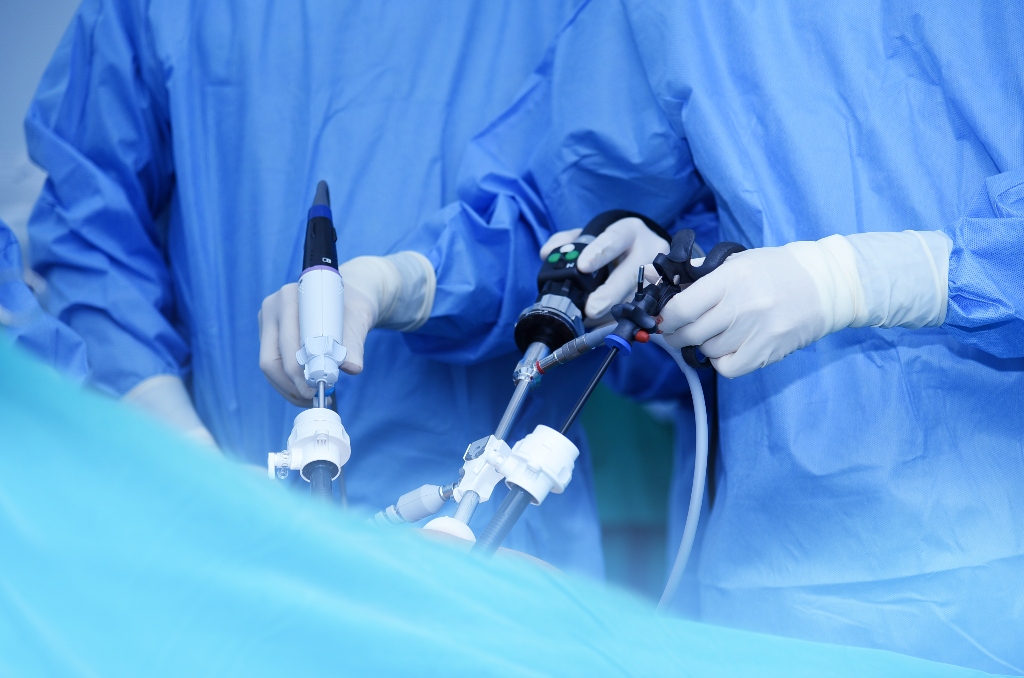A surgeon performing laparoscopic surgery in the abdomen of a patient in the operating room. Photo: amab/Shutterstock.com
As part of Phase 1 reopening plans for Florida, elective surgeries are to resume at health facilities statewide. The news is a much-needed welcome for patients and the hospitals that have lost millions of dollars during the coronavirus pandemic. Southwest Florida hospitals already began easing their way back into elective surgeries starting on Monday, May 4. But hospitals are taking precautions to keep every patient safe.
Lee Health in Fort Myers says it’s limiting surgeries at 20% to 25% of normal volume while it monitors the impact on the health system. Every patient will be screened for symptoms, and everyone will be required to wear a face covering.
Florida Governor Ron DeSantis met with doctors at Halifax Health in Daytona Beach on Sunday to discuss the importance of hospitals getting back to normal. “This will allow the system to start running again like it should,” DeSantis said. “These are really important things for people’s health and we want to make sure that people understand that this is something they’re going to be able to schedule going forward.” DeSantis stopped all elective surgeries more than a month ago to free up space and supplies for coronavirus patients.
There continues to be a downward trend in the number of new cases, which has led the governor to allow elective surgeries, according to state health officials.
After weeks of shutdowns to slow the spread of coronavirus, Governor Ron DeSantis says elective surgeries are ready to begin again on Monday, May 4. Photo: Governor’s Press Office/www.health.wusf.usf.edu
Halifax officials said they’ve taken steps to stop the spread of the virus by making sure COVID-19 patients from long term care facilities test negative twice before being released. A separate wing of the hospital was also created to isolate COVID-19 patients and the staff treating them.
In Mid-March, the Centers for Medicare and Medicaid Services recommended a delay of elective procedures across the country to preserve protective equipment for hospital workers, and to make sure health care workers were available to care for an expected onslaught of novel coronavirus patients.
DeSantis also announced Sunday that Florida has received 200,000 antibody blood tests to determine whether people have been exposed to the novel coronavirus without knowing it. He said he would start distributing the tests, first to health care workers, and then perhaps make an antibody test lane at drive-through testing sites across the state.
A lab scientist performing a rapid diagnostic test (RDT) for antibodies to detect presence of viral protein (antigens) expressed by COVID-19. Photo: Cryptographer/Shutterstock.com
The Florida Governor said the information from the antibody blood tests is key to helping researchers determine just how widespread COVID-19 has been in the state. And he noted that Florida may team up with universities to conduct further research. Antibody tests in other cities and states have helped reveal a much higher number of people have been exposed to coronavirus without knowing they were infected.
Governor DeSantis expects the tests to be distributed in the next few days.
NCH Healthcare System and Physicians Regional in Collier County are also restarted elective procedures on Monday while continuing to isolate COVID-19 patients. Those health facilities will require masks and mandate screenings for symptoms.
Governor Ron DeSantis said Sunday such as elective surgeries are necessary for hospitals who are struggling financially. With elective surgeries, hospitals can bring in much-needed revenue after losing millions of dollars due to the coronavirus pandemic shutting down most hospitals to treat novel coronavirus patients as a top priority. Because of this, many hospitals have had to furlough workers.
The Governor hopes this helps hospitals stay afloat and ensures people get the procedures they need.
Physicians statewide recommend patients get these types of surgeries now while it is safe to have it done, so individuals won’t suffer from any irreparable damage.
“Things like aneurysm surgery, limb salvage surgery, heart bypass, even some cancer procedures that may be the providers over the past couple of weeks had decided in the interest of public health and the interest of the patient’s safety and the staff’s safety to delay a couple weeks, it’s now time to do those procedures,” said Dr. Robert J. Feezor with UF Health Heart and Vascular Surgery at Halifax Health in Daytona Beach.

